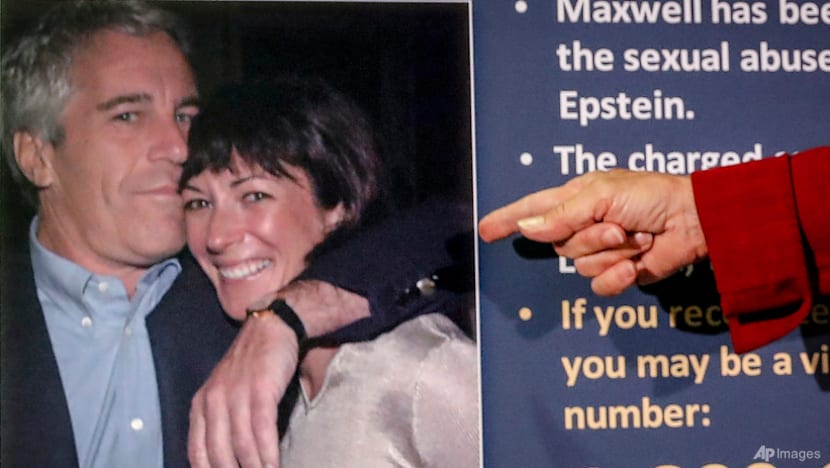US Justice Department issues transcripts of interviews with Epstein ex-girlfriend Maxwell
The US Attorney General's office has released the transcript of its interview with Jeffrey Epstein's co-conspirator and ex-girlfriend, Ghislaine Maxwell, amid backlash for not doing so earlier.

A photo of Jeffrey Epstein and Ghislaine Maxwell, during a news conference in New York on Jul 2, 2020, as Audrey Strauss, acting US attorney for the Southern District of New York, points to the image. (Photo: AP/John Minchillo)
WASHINGTON: The US Justice Department on Friday (Aug 22) released transcripts of interviews with Jeffrey Epstein's imprisoned former girlfriend, Ghislaine Maxwell, as the Trump administration tries to present itself as transparent amid a fierce backlash over its earlier refusal to release records from the sex-trafficking case.
The disclosure represents the latest Trump administration effort to repair self-inflicted political wounds after failing to deliver on expectations in part of its own making, and that of conspiracy theories.
By making public two days' worth of interviews, officials may be hoping to at least temporarily keep at bay sustained anger from President Donald Trump's base, as they continue to sit on other evidence they had suggested was being prepared for public release.
Maxwell recalled knowing about Trump and possibly meeting him for the first time in 1990, when her newspaper magnate father, Robert Maxwell, was the owner of the New York Daily News.
“I may have met Donald Trump at that time, because my father was friendly with him and liked him very much,” Maxwell said, according to the transcript.
Maxwell said her father was fond of Trump’s then-wife, Ivana, “because she was also from Czechoslovakia, where my dad was from”.
Maxwell, a one-time socialite who was convicted in 2021 of helping lure teenage girls to be sexually abused by Epstein, was interviewed over the course of two days last month by Deputy Attorney General Todd Blanche at a Florida courthouse.
Maxwell is serving a 20-year sentence in a minimal security prison camp in Texas.
The Epstein case captured public attention because of the wealthy financier's social connections, including to Prince Andrew, former US president Bill Clinton, and Donald Trump.
Epstein was arrested in 2019 on sex-trafficking charges, accused of sexually abusing dozens of teenagers. He was found dead in a jail cell in New York in what investigators say was a "suicide". The current president said his relationship with Epstein ended years before.
SAGA HAS CONSUMED THE TRUMP ADMINISTRATION
The saga has consumed the Trump administration over the last month following an abrupt two-page announcement from the Federal Bureau of Investigation (FBI) and US Justice Department that Epstein had killed himself despite conspiracy theories to the contrary, that a “client list” that Attorney General Pam Bondi had intimated was on her desk did not actually exist and that no additional documents from the high-profile investigation were suitable to be released.
The announcement produced outrage from conspiracy theorists, online sleuths and Trump supporters who had been hoping to see proof of a government cover-up, an expectation driven in part by comments from officials including FBI director Kash Patel and Dan Bongino, who on podcasts before taking their current positions had repeatedly promoted the idea that damaging details about prominent people were being withheld.
Patel, for instance, said in at least one podcast interview before becoming director that Epstein’s “black book” was under the “direct control of the director of the FBI”.
The administration had an early stumble in February when far-right influencers were invited to the White House and provided by Bondi with binders marked “The Epstein Files: Phase 1” and “Declassified” that contained documents that had largely already been in the public domain.
After the first release fell flat, Bondi said officials were poring over a “truckload” of previously withheld evidence, which she said had been handed over by the FBI and raised expectations of forthcoming releases.














